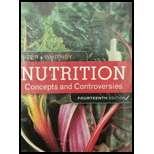
Bundle: Nutrition: Concepts and Controversies, Loose-leaf Version, 14th + LMS Integrated for MindTap Nutrition, 1 term (6 months) Printed Access Card
14th Edition
ISBN: 9781337127547
Author: Frances Sizer, Ellie Whitney
Publisher: Cengage Learning
expand_more
expand_more
format_list_bulleted
Concept explainers
Question
Chapter 8, Problem 1SC
Summary Introduction
Introduction:
Water plays a crucial role as it helps in maintaining homeostasis and it constitutes major composition of the cells and the body. Water is lost from our body while running, urinating, perspiration and sweating. So, it is very important that the water balance is maintained to carry normal physiological activities. To regulate the water balance in human body, brain and kidneys play a pivotal role.
Expert Solution & Answer
Trending nowThis is a popular solution!

Chapter 8 Solutions
Bundle: Nutrition: Concepts and Controversies, Loose-leaf Version, 14th + LMS Integrated for MindTap Nutrition, 1 term (6 months) Printed Access Card
Ch. 8 - Prob. 1RQCh. 8 - Prob. 2RQCh. 8 - Prob. 3RQCh. 8 - Prob. 1CTCh. 8 - Prob. 2CTCh. 8 - Prob. 1SCCh. 8 - Prob. 2SCCh. 8 - Water from public water systems requires frequent...Ch. 8 - Prob. 4SCCh. 8 - Prob. 5SC
Ch. 8 - Prob. 6SCCh. 8 - Vomiting or diarrhea causes fluid to be pulled...Ch. 8 - Which two minerals are the major constituents of...Ch. 8 - Prob. 9SCCh. 8 - Prob. 10SCCh. 8 - Prob. 11SCCh. 8 - The top food sources of zinc include a. grapes. b....Ch. 8 - Prob. 13SCCh. 8 - Which of these mineral supplements can easily...Ch. 8 - Prob. 15SCCh. 8 - Prob. 16SCCh. 8 - Prob. 17SCCh. 8 - Prob. 18SCCh. 8 - Prob. 19SCCh. 8 - Too little in the diet is associated with...
Knowledge Booster
Learn more about
Need a deep-dive on the concept behind this application? Look no further. Learn more about this topic, health-nutrition and related others by exploring similar questions and additional content below.Similar questions
- The body loses water by way of the ________. a. skin b. lungs c. digestive system d. urinary system e. both c and d f. a through darrow_forward1. The outer one-third of the kidney is called the A. Medulla B. Minor calyces C. Renal pyramid D. Cortexarrow_forwardBlood pressure forces water and small solutes out of blood and into nephrons during ________. a. glomerular filtration c. tubular secretion b. tubular reabsorption d. both a and carrow_forward
- 2. Glomerular filtration is directly proportional to A. Blood cell size B. Hydrostatic pressure C. Osmotic pressure D. The patient’s fluid intakearrow_forwardThe fine tuning of water recovery or disposal occurs in ________. a. the proximal convoluted tubule b. the collecting ducts c. the ascending loop of Henle d. the distal convoluted tubulearrow_forwardWhich of the following does not contribute to the process of filtration? (a) active transport by epithelial cells lining renal tubules (b) large surface area for filtration (c) low permeability of glomerular capillaries (d) high hydrostatic blood pressure in glomerular capillaries (e) podocytesarrow_forward
- Which of the following does not contribute to the high salt concentration in the interstitial fluid of the kidney medulla? (a) active transport of sodium from the upper part of the ascending limb (b) diffusion of salt from the ascending limb of the loop of Henle (c) reabsorption of salt from various regions of Bowmans capsule (d) counterflow of fluid through the two limbs of the loop of Henle (e) diffusion of urea out of the collecting ductarrow_forwardThe right kidney is slightly lower because ________. it is displaced by the liver it is displace by the heart it is slightly smaller it needs protection of the lower ribsarrow_forwardThe largest amount of water leaves the body via ________. a. the GI tract b. the skin as sweat c. expiration d. urinearrow_forward
- The afferent arteriole delivers blood to the (a) renal artery (b) efferent arteriole (c) renal vein (d) capillaries of the glomerulus (e) peritubular capillariesarrow_forwardIf there were no aquaporin channels in the collecting duct, ________. you would develop systemic edema you would retain excess Na+ you would lose vitamins and electrolytes you would suffer severe dehydrationarrow_forwardCountercurrent flow of water and blood increases the efficiency of gas exchange in ______. a. fishes c. birds b. amphibians d. all of the abovearrow_forward
arrow_back_ios
arrow_forward_ios
Recommended textbooks for you
 Comprehensive Medical Assisting: Administrative a...NursingISBN:9781305964792Author:Wilburta Q. Lindh, Carol D. Tamparo, Barbara M. Dahl, Julie Morris, Cindy CorreaPublisher:Cengage Learning
Comprehensive Medical Assisting: Administrative a...NursingISBN:9781305964792Author:Wilburta Q. Lindh, Carol D. Tamparo, Barbara M. Dahl, Julie Morris, Cindy CorreaPublisher:Cengage Learning Human Biology (MindTap Course List)BiologyISBN:9781305112100Author:Cecie Starr, Beverly McMillanPublisher:Cengage Learning
Human Biology (MindTap Course List)BiologyISBN:9781305112100Author:Cecie Starr, Beverly McMillanPublisher:Cengage Learning



Comprehensive Medical Assisting: Administrative a...
Nursing
ISBN:9781305964792
Author:Wilburta Q. Lindh, Carol D. Tamparo, Barbara M. Dahl, Julie Morris, Cindy Correa
Publisher:Cengage Learning

Human Biology (MindTap Course List)
Biology
ISBN:9781305112100
Author:Cecie Starr, Beverly McMillan
Publisher:Cengage Learning

